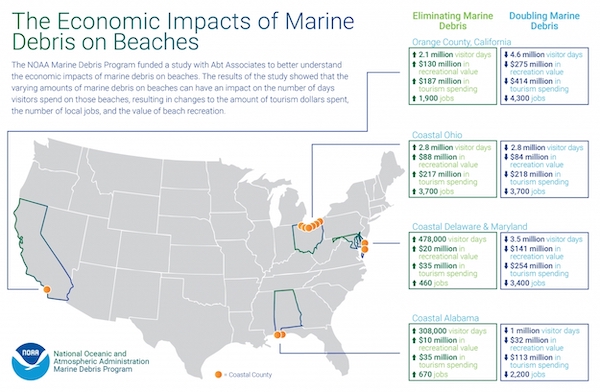There is no doubt in my mind that the more tourists, the more beach trash. The more beach trash, the ickier a place becomes. In many countries much of the trash is washed up from other countries, but where I live, it is the tourist who leave broken beach chairs, towels, shoes, glass bottles, food wrappers, toys on the beach. Can it really be that these 50,000 people are really that clueless?
NOAA did a study on beach trash AKA marine debris and tourism on a few beaches in the United States and found that clean beaches bring in more dollars.

- Marine debris is a huge issue in many coastal areas of the United States, where tourism and recreation account for $124 billion in gross domestic product.
- According to a Save the Beach poll, one in 10 Spaniards have stopped going to a beach due to its poor state. Meanwhile, 14 percent of the rest of Europe have done the same. Apparently 66 percent of those polled believe that public administrations pay “little or no” attention to the problem.
- The cost to local governments to clean beaches along 90 towns in Washington, Oregon, and California was estimated at more than $500 million in a 2012 study.
- By one estimate, at least US$13 billion a year. This estimate was derived by estimating what it would cost companies that produce consumer goods to “internalize” the costs associated with their current practices (e.g., pay for cleanup of plastic waste). $13 billion a year is likely to be a significant underestimate too because there is so little information on the impacts of plastic waste (e.g., for microplastics) and it doesn’t include costs such as the transport of invasive marine species attached to plastics in the ocean.
- Study #1 estimated that marine litter may reduce tourism in Brazil by 39%, representing losses of up to US$ 8.5 million a year.
- Study #2 estimated that marine litter has cost the US states of New York and New Jersey billions of dollars in lost tourism revenue and decreased the value of waterfront homes.
- Study #3: Litter along the Skagerrak coast of Sweden is estimated to have reduced tourism between 1 and 5%, leading to an estimated annual loss of ~ US$22.5 million.
- Study #4- In 2011, when heavy rains washed up tons of marine litter onto the beaches of Goeje Island, South Korea, leading to 500,000 fewer visitors in 2011 than in 2010 and led to a loss if revenue of ~ US$30 million.
- Study #5 interviewing beachgoers in Orange County, California, estimated that a 50% reduction in marine litter could generate US$67 million in benefits to residents over a three-month period. They rated the cleanliness of beaches (i.e., lack of litter) as important as good water quality and even more important than scenic beauty, parking convenience and expense, proximity to home, sandiness, and level of crowding.
Bottom line, as we travel think about your footprint. Take your own bottle and do not litter.
Resources
Marine Debris and the Coastal Tourism Economy – https://www.maritime-executive.com/editorials/infographic-marine-debris-and-the-coastal-tourism-economy
Does Marine Debris effect Tourism Perception and Tourism Revenue: Study in Brazil
Cost of Marine Debris in Great Lakes
Beach Cleanup Highlight Ocean Plastic Problem
Amazing Tourist Destinations Being Ruined by Trash
Vacations in This World of Trash
22 Destinations Ruined by Trash

Makes perfect sense! Now to get people on board…especially the perps.